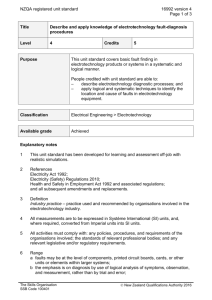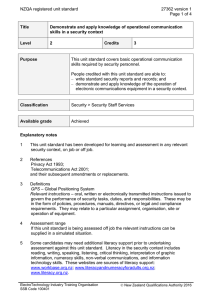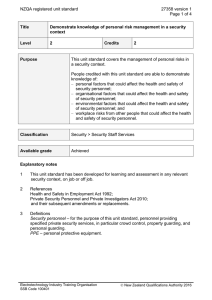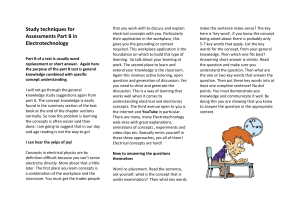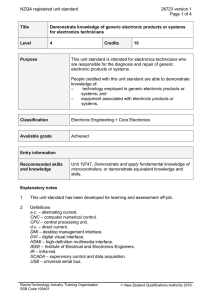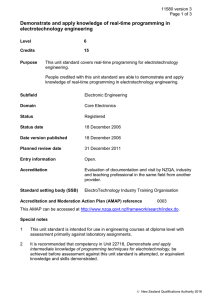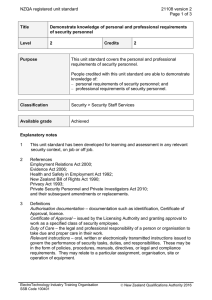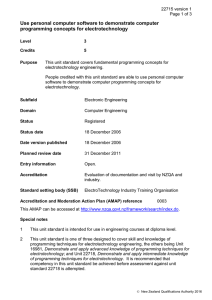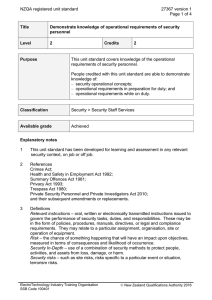NZQA registered unit standard 16973 version 5 Page 1 of 3
advertisement
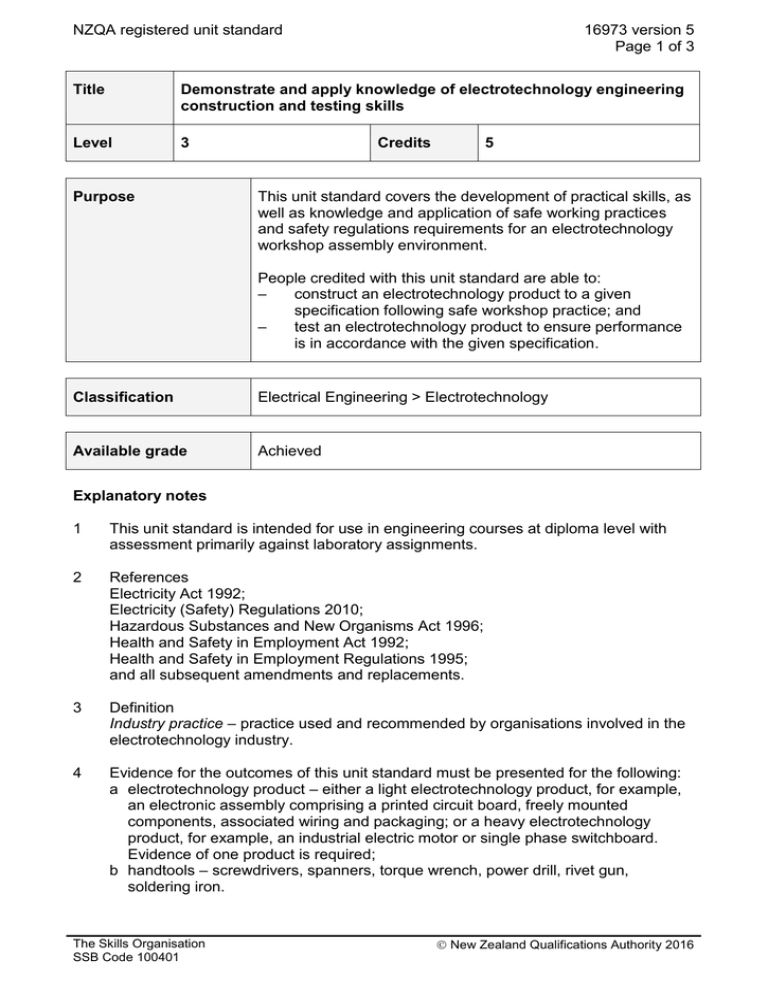
NZQA registered unit standard 16973 version 5 Page 1 of 3 Title Demonstrate and apply knowledge of electrotechnology engineering construction and testing skills Level 3 Purpose Credits 5 This unit standard covers the development of practical skills, as well as knowledge and application of safe working practices and safety regulations requirements for an electrotechnology workshop assembly environment. People credited with this unit standard are able to: – construct an electrotechnology product to a given specification following safe workshop practice; and – test an electrotechnology product to ensure performance is in accordance with the given specification. Classification Electrical Engineering > Electrotechnology Available grade Achieved Explanatory notes 1 This unit standard is intended for use in engineering courses at diploma level with assessment primarily against laboratory assignments. 2 References Electricity Act 1992; Electricity (Safety) Regulations 2010; Hazardous Substances and New Organisms Act 1996; Health and Safety in Employment Act 1992; Health and Safety in Employment Regulations 1995; and all subsequent amendments and replacements. 3 Definition Industry practice – practice used and recommended by organisations involved in the electrotechnology industry. 4 Evidence for the outcomes of this unit standard must be presented for the following: a electrotechnology product – either a light electrotechnology product, for example, an electronic assembly comprising a printed circuit board, freely mounted components, associated wiring and packaging; or a heavy electrotechnology product, for example, an industrial electric motor or single phase switchboard. Evidence of one product is required; b handtools – screwdrivers, spanners, torque wrench, power drill, rivet gun, soldering iron. The Skills Organisation SSB Code 100401 New Zealand Qualifications Authority 2016 NZQA registered unit standard 16973 version 5 Page 2 of 3 c electrotechnology equipment and tools – either appropriate to light electrotechnology or heavy electrotechnology applications. 5 All measurements are to be expressed in Système International (SI) units, and, where required, converted from Imperial units into SI units. 6 All activities must comply with: any policies, procedures, and requirements of the organisations involved; the standards of relevant professional bodies; and any relevant legislative and/or regulatory requirements. 7 Range a performance in relation to the outcomes of this unit standard must comply with the Health and Safety in Employment Act 1992 b laboratory and workshop safety practices are to be observed at all times. Outcomes and evidence requirements Outcome 1 Construct an electrotechnology product to a given specification following safe workshop practice. Range electrotechnology product to comprise in the order of twenty components. Evidence requirements 1.1 Components and materials are selected and stored according to specification requirements in accordance with industry practice. Range 1.2 temperature, moisture, electrostatic charge. Product is constructed following industry and safe working practices and with regard to mechanical, electrical, and operational performance of the product, and product quality and safety. Outcome 2 Test an electrotechnology product to ensure performance is in accordance with the given specification. Evidence requirements 2.1 Tests are conducted in accordance with industry practice to confirm that the product performs to specification in accordance with industry and safe working practice. Range The Skills Organisation SSB Code 100401 tests to include but are not limited to – mechanical, electrical, operational, performance, quality, safety. New Zealand Qualifications Authority 2016 NZQA registered unit standard Planned review date 16973 version 5 Page 3 of 3 31 December 2014 Status information and last date for assessment for superseded versions Process Version Date Last Date for Assessment Registration 1 27 April 2000 31 December 2013 Revision 2 3 April 2001 31 December 2013 Review 3 18 December 2006 N/A Rollover and Revision 4 15 March 2012 N/A Revision 5 15 January 2014 N/A Consent and Moderation Requirements (CMR) reference 0003 This CMR can be accessed at http://www.nzqa.govt.nz/framework/search/index.do. Please note Providers must be granted consent to assess against standards (accredited) by NZQA, before they can report credits from assessment against unit standards or deliver courses of study leading to that assessment. Industry Training Organisations must be granted consent to assess against standards by NZQA before they can register credits from assessment against unit standards. Providers and Industry Training Organisations, which have been granted consent and which are assessing against unit standards must engage with the moderation system that applies to those standards. Requirements for consent to assess and an outline of the moderation system that applies to this standard are outlined in the Consent and Moderation Requirements (CMR). The CMR also includes useful information about special requirements for organisations wishing to develop education and training programmes, such as minimum qualifications for tutors and assessors, and special resource requirements. Comments on this unit standard Please contact The Skills Organisation reviewcomments@skills.org.nz if you wish to suggest changes to the content of this unit standard. The Skills Organisation SSB Code 100401 New Zealand Qualifications Authority 2016
